[ad_1]
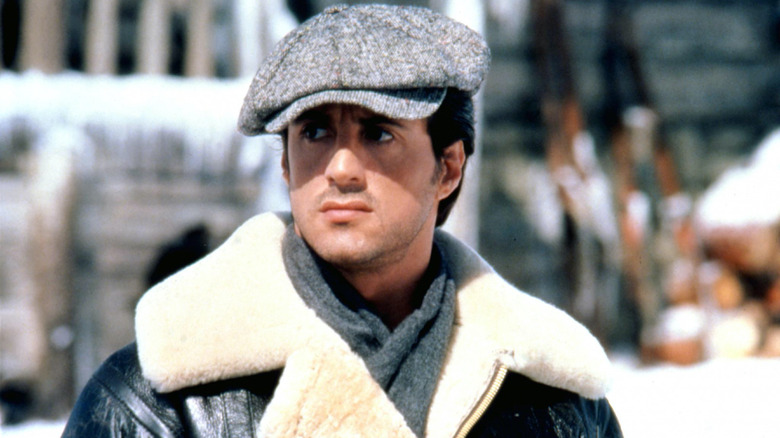
There are generally two main schools of thought on “Rocky IV:” You can bemoan how ridiculous the franchise had become since the grittiness of the Oscar-winning original film, or celebrate it for finally shrugging off all semblance of reality to become such a glorious example of ’80s excess. I say life is too short for the former and, while it is the most thinly plotted of the series to that point, I still love “Rocky IV” for the bombastic sports cartoon that it is.
Rocky Balboa (Sylvester Stallone) is no longer just the lovable slugger from Philly; now he is a boxing superhero whose powers are an indestructible head and indefatigable spirit, a man so full of good intentions that he can even win the hearts of those stony-faced Russians in the death throes of the Cold War. That is where we end up in “Rocky IV.” Having conquered Apollo Creed (Carl Weathers) over two bouts to become the long-shot heavyweight champion of the world in “Rocky” and “Rocky II,” and losing and reclaiming his title against the ferocious Clubber Lang (Mr. T) in “Rocky III,” where else was there for the Italian Stallion to go? Geopolitics, naturally.
Released the same year that John Rambo, Stallone’s other iconic character, went back to Vietnam and got to win this time in “Rambo: First Blood Part II,” Rocky Balboa found himself fighting for America against Ivan Drago (Dolph Lundgren), an apparently unstoppable killing machine from the Soviet Union. Politics hadn’t played much of a role in the “Rocky” franchise previously, but here our determined hero had something to say about East-West relations at a time when tension between the United States and the USSR was still very high. Let’s take a closer look at how it all played out.
So What Happens In Rocky IV Again?
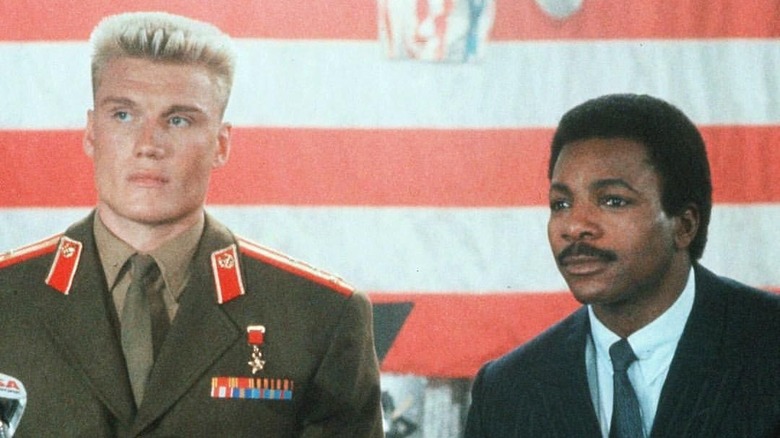
After the customary recap of the events at the end of “Rocky III,” Ivan Drago (Dolph Lundgren), the towering Olympic boxing champ from the Soviet Union arrives in the States with his wife Ludmila (Brigitte Nielsen) and a squad of trainers, seeking to demonstrate the Soviet Union’s athletic prowess over the rest of the world. With his mobile high-tech training facility, Drago wows the press with his enormously punching power. As if that wasn’t enough, he’s also jacked on performance-enhancing drugs.
Apollo Creed (Carl Weathers), fueled by patriotism and a feeling of obsolescence since he retired from professional boxing, challenges Drago to a glitzy exhibition fight in Las Vegas. Rocky thinks it’s a bad idea but still agrees to be in Apollo’s corner for the bout.
Apollo puts on a big show for the crowd, arriving amid a flurry of showgirls and romping around in his trademark stars-and-stripes top hat and tails while James Brown belts out “Living in America.” The steely Russian looks nonplussed by all the razzle-dazzle and seems to have missed the memo that it is supposed to be an exhibition match. After Apollo initially takes the fight to Drago, the Soviet fighter switches to killer cyborg mode and batters the showboating old pro. Apollo’s trainer Duke (Tony Burton) wants to stop the fight, but Creed is determined to carry on. The mauling continues in the second round and Rocky hesitates too long throwing in the towel. Apollo dies in the ring.
Grieving for his friend and feeling guilty for not stopping the fight in time, Rocky decides to give up his title to take on Drago in an unsanctioned match in Moscow on Christmas day. Can Rocky gain revenge over the deadly Russian and win over the hostile home crowd?
The Fatal Flaws Of Apollo Creed
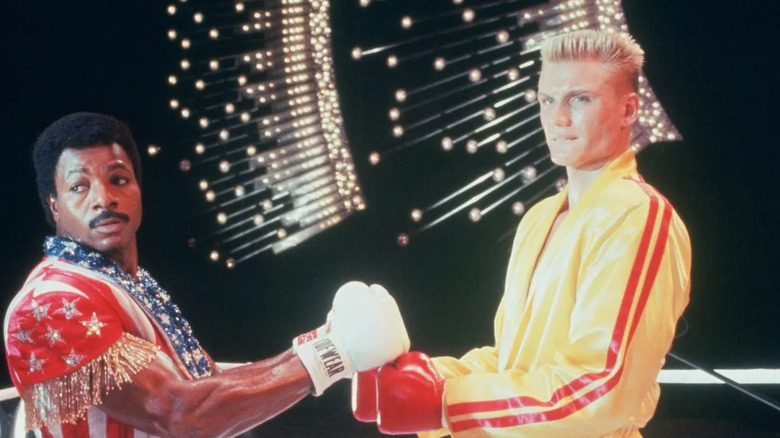
While “Rocky IV” has a reputation for silliness, it at least has some things to say about aging and obsolescence for fighters like Rocky and Apollo, neither of whom were exactly spring chickens in the original film. Apollo, played so memorably by Carl Weathers, has one of the most interesting arcs in the entire series. When we first meet him in “Rocky,” he’s a rich, business-like champ who makes the mistake of underestimating Balboa, who takes him the distance despite the odds. He becomes more of a baddie in the second movie, which is also where we see his fatal flaws emerge: Pride and a brittle ego. Furious about the result of the first fight (although he won on points), he demands a rematch to prove Rocky taking him all the way was a fluke and ends up losing his title to the gutsy challenger.
In “Rocky III,” Apollo offers to train Rocky after Mickey’s death for a number of reasons, including missing the action now he’s retired and Clubber Lang bad-mouthing him before his first clash with the Italian Stallion. That pride and ego play a huge part in his decision to challenge Drago in “Rocky IV,” which leads to his tragic demise. Even with his wife watching on in the audience, he can’t bring himself to admit that the Russian is too powerful for him and gets beaten to death as a result. One might argue that Apollo went out the way he wanted, fighting in the ring; but the weariness and despair in his eyes after the first punishing round suggests he knows he’s made a bad mistake but is too proud to go back on it.
The Real Creed Vs Drago?
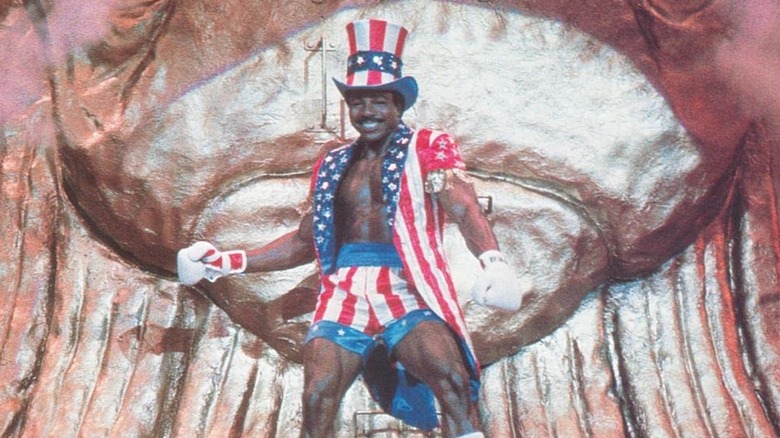
With his showmanship, big talk, and dancing feet, Muhammad Ali provided one of Sylvester Stallone’s main inspirations for Apollo Creed (via Yahoo). While there is little to suggest that Apollo’s fight against Ivan Drago had any basis in reality, it is worth noting in the Cold War context that Ali faced a similarly hard-as-nails Russian opponent when he made his “Peace Mission” to Moscow in 1978.
Shortly before his rematch against Leon Spinks allowed him to regain his world heavyweight title for the third time, Ali spent 10 days in the Soviet Union. As well as an hour-long chat with Russian premier Leonid Brezhnev, the centerpiece of his visit was an exhibition match. Over six rounds, Ali faced three different fighters, the last of whom made him realize he was in a proper fight.
A little out of practice and carrying a few extra pounds, Ali found himself up against Igor Vysotsky, born in one of Joseph Stalin’s gulags and twice victor over Cuban Olympic gold medalist Teófilo Stevenson (via Independent). Although he never got to compete at the Olympics himself, Vysotsky was a tough character with a formidable record, a fast puncher who never lost by K.O. in his whole career.
Vysotsky went after the former champ from the start, peppering him with hard shots and frequently forcing him back against the ropes and into the corners. Ali, feeling tired after the two previous opponents, had little choice but to defend well and get a few punches of his own in before the final bell. Thankfully, the fight didn’t have the same devastating conclusion as Creed vs Drago, and Ali returned to the U.S. full of praise for his Russian hosts (via New York Times).
Rocky IV’s Historical Context
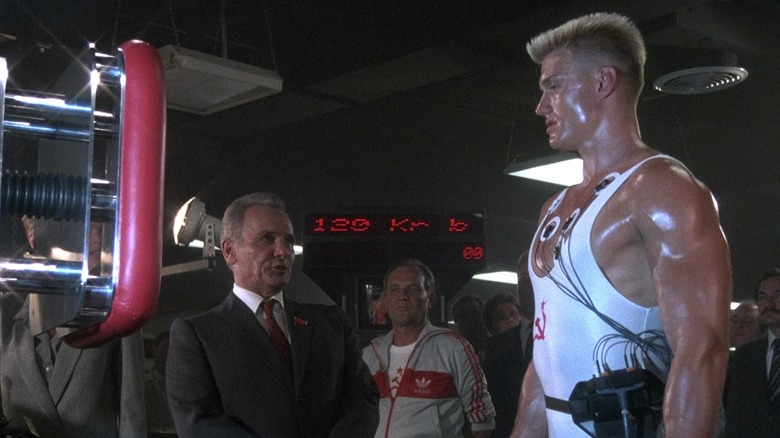
When “Rocky IV” was released in March 1985, the end of the Cold War was little more than six years away, but it was still a very dangerous time in terms of East-West relations. In September ’83, the world came the closest to a nuclear war since the Cuban Missile Crisis when Stanislav Petrov, a Soviet Air Force Officer, trusted his instincts and ignored a computer warning that American missiles were inbound and he should launch a counter-attack. Earlier that year, U.S. President Ronald Reagan referred to the Soviet Union as an “evil empire” shortly before unveiling his ambitious and controversial Strategic Defense Initiative, dubbed “Star Wars,” which he hoped in the long term would render nuclear weapons “impotent and obsolete” (via New York Times). In the short term, the scheme was met with disapproval and threats of retaliation from the Kremlin.
As for Ivan Drago’s use of anabolic steroids, it certainly isn’t far-fetched. Doping was widespread in sports during the Soviet era in Russia as leaders sought an ideological victory over the West, to the extent that plans for a statewide doping scheme were put in place ahead of the 1984 Olympic Games in Los Angeles, before the powers that be decided to boycott the event (via New York Times). Such schemes weren’t restricted to Russian athletes; Czechoslovak competitors under the Communist regime were “systematically” given performance-enhancing drugs (PEDs) (via Radio Prague), and East Germany had a similar statewide doping initiative (via Timeline). Since Drago is an Olympic gold medalist for the Soviet Union, he almost certainly would have come into contact with illicit PEDs during that time.
Adrian Helps Rocky Get His Head Together Again
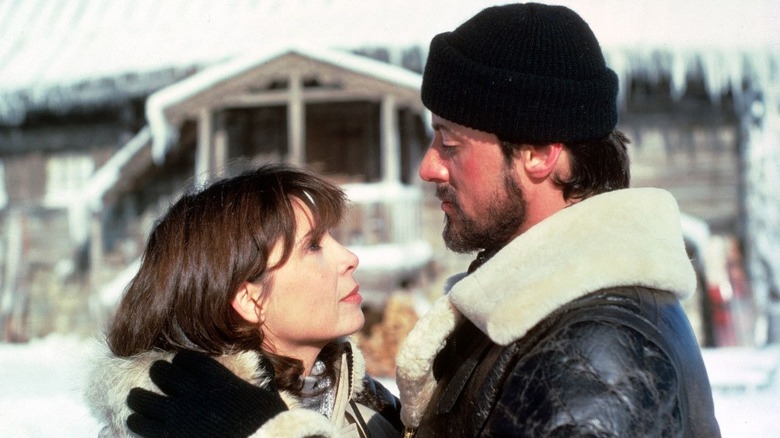
As with the previous films in the franchise, Rocky’s wife Adrian (Talia Shire) has a crucial role to play in helping Balboa get his head straight in time for the final fight in “Rocky IV.” She is typically disapproving of his decision to fight Ivan Drago in Russia, especially so soon after Apollo Creed’s death. Guilt-ridden over his failure to stop the bout in time, Rocky has decided to train in Russia so he can focus purely on his opponent.
Adrian pleads against Rocky’s motivations, as he is putting everything on the line to face Drago, and beating him won’t bring Apollo back. “Why can’t you change your thinking, because everyone else does?” It might seem like she is going through the usual motions in this scene, but that line is key because it feeds into Rocky’s appeal for peace at the end of the movie.
After a montage that pretty much recaps the whole “Rocky” series so far, Rocky, Paulie, and Duke are off to the frozen wastes of Russia, where Stallion will train in a woodshed under the watchful eye of the KGB while Drago works out in his high-tech facility. In between two training montages, Adrian arrives at the remote cabin, saying she couldn’t stay away and she’s with him no matter what. (I don’t know what kind of mother would leave their kid home alone to watch their dad potentially get beaten to a pulp on Christmas Day live on TV, but there you are.) Adrian’s presence brings a little more energy and focus to Rocky’s training. Scaling a mountain instead of his usual famous steps in Philadelphia, he yells Drago’s name; he is ready.
The Final Showdown
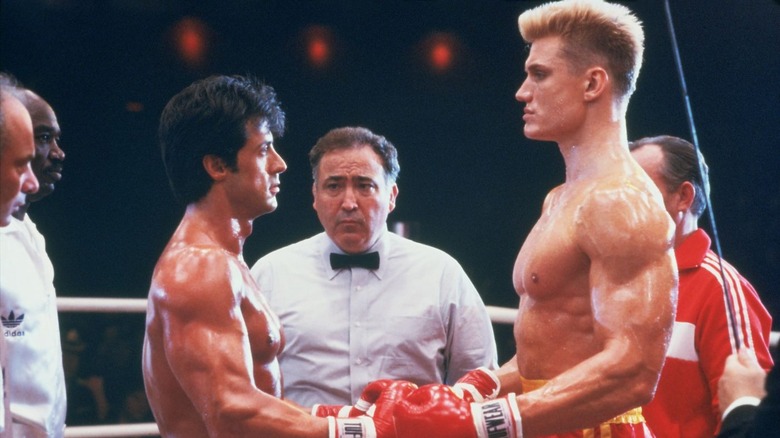
On the night of the fight, Rocky faces an intimidating atmosphere as he makes his way to the ring. The Russian crowd is extremely hostile and looks almost ready to mob him. Meanwhile, up in the gallery, the General Secretary of the Communist Party (obviously meant to be Mikhail Gorbachev, although he isn’t mentioned by name) takes his seat flanked by members of the Politburo. The Russian anthem is received with awed reverence, while the Star-Spangled Banner is booed.
Once the formalities are all done, it’s time for a fight. “I must break you,” Drago reassures his opponent, and away they go. Rocky is forced into the corner straight away and takes a beating, but manages to scurry away from Drago’s clubbing fists. He tries to stay in the middle of the ring but Drago’s long reach causes him serious problems. Trying to get a foothold in the fight, Rocky pushes the Russian into a corner and works on his midriff. He lets Rocky have his fun before throwing him into another corner and blasting away again. Rocky somehow survives the onslaught and makes it to the bell.
The second round starts in much the same manner, but Rocky fires off a big shot that cuts the Russian. Suddenly, there is a ray of hope; Drago is human after all. The round ends with Drago pinned in the corner absorbing a flurry of blows from Balboa.
Rocky battles away for the next twelve rounds and his dogged determination begins to win over the partisan crowd. The fight goes down to the final round and Rocky resorts to his usual strategy of letting his opponent slug away at him before hitting him on the counter-attack. Finally, Rocky gets the upper hand and sends Drago sprawling to the canvas, slumping to defeat on the count of nine.
Everybody Can Change
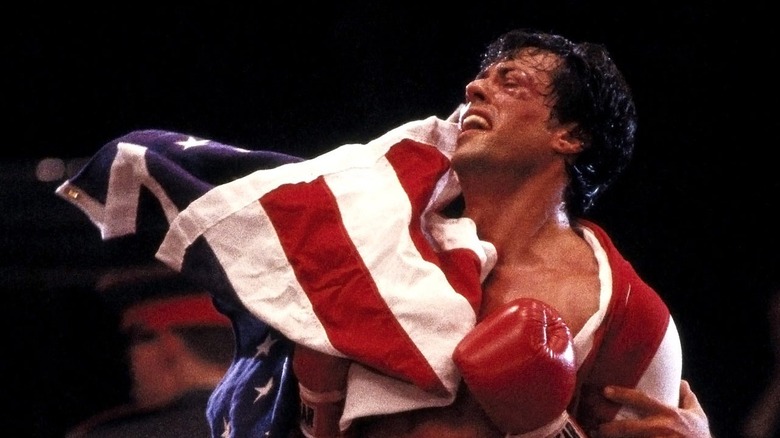
Once the fight is over, Rocky makes an impassioned speech to the crowd, echoing Adrian’s earlier words to him:
“During this fight, I’ve seen a lot of changing, in the way you feel about me, and in the way I feel about you. In here, there were two guys killing each other, but I guess that’s better than twenty million. I guess what I’m trying to say, is that if I can change, and you can change, everybody can change!”
We see Mikhail Gorbachev applauding Rocky’s speech and, ridiculous as it may sound, the real Russian Premier’s sentiments on the West weren’t too dissimilar. Gorbachev became General Secretary of the Communist Party on March 15, 1985, a few days before “Rocky IV” started principal photography, and he soon instigated a series of reforms known as Perestroika (“Restructuring”) and Glasnost (“Openness”), setting into motion a process of change that softened rhetoric on nuclear deterrence and eventually contributed to the breakup of the Soviet Union (via History). In a speech to the UN in December 1988, he concluded (via Washington Post):
“I would like to believe that our hopes will be matched by our joint effort to put an end to an era of wars, confrontation, and regional conflicts, to aggressions against nature, to the terror of hunger and poverty as well as to political terrorism. This is our common goal and we can only reach it together.”
While it is common for critics of “Rocky IV” to pour scorn on the idea that Rocky somehow defeated Communism, Sylvester Stallone should be given a little credit for anticipating the winds of change that would soon start blowing through the countries behind the Iron Curtain. Maybe it’s a shame that the Italian Stallion isn’t still around to help broker peace in the Russia-Ukraine war.
Read this next: The 15 Best Cold War Movies Ranked
The post Rocky IV Ending Explained: Everybody Can Change appeared first on /Film.
[ad_2]
Source link

Comments are closed.